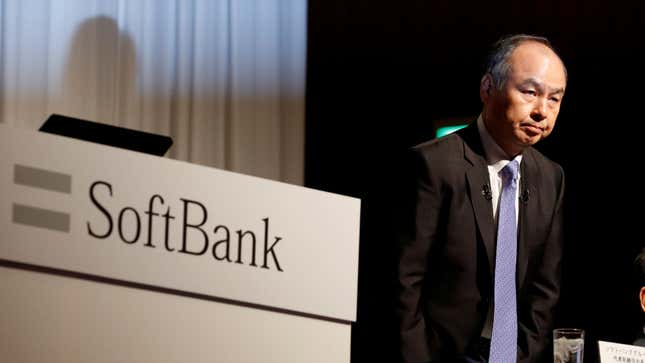Indian Family Offices Invest in FirstCry, Diluting SoftBank Stake Ahead of IPO In 2023
Three prominent Indian family investment offices have taken significant stakes in FirstCry, an online retailer specializing in children's and baby products. The investments, totaling around Rs 435 crore, were predominantly acquired from FirstCry's largest investor, SoftBank. This infusion of capital comes as FirstCry prepares for an IPO and seeks to increase local investor ownership while adhering to the country's Foreign Direct Investment (FDI) regulations for e-commerce.

Three Indian family investment offices have acquired shares in the online retailer FirstCry, specializing in children’s and baby products, for approximately Rs 435 crore.
Notably, these investment offices include Ranjan Pai’s MEMG Family Office from the Manipal Group, Harsh Mariwala’s Sharrp Ventures linked to Marico, and Hemendra Kothari’s DSP family office.
Their investments are primarily directed at buying stakes from SoftBank, the largest prior investor in FirstCry, as confirmed by the e-commerce firm.
Earlier on August 14, it was reported that Pai was in the process of finalizing an investment of around Rs 250 crore in FirstCry.
As part of a secondary share sale, SoftBank, which held a 29% stake in the company, has likely decreased its ownership by approximately 1.5-2%.

Supam Maheshwari, the CEO of FirstCry, expressed gratitude towards the company’s early investors for their role in its success and extended a warm welcome to the new investors.
He praised the new investors for their successful track record and expertise in scaling significant businesses in India, which will contribute positively to FirstCry’s journey ahead.
Secondary share sales involve existing investors selling shares to new investors, and the funds generated do not contribute to the company’s coffers. In addition to SoftBank’s divestment, FirstCry’s other notable investors include Premji Invest, Mahindra Retail, and TPG.
Ranjan Pai is also finalizing investments in new-age firms such as Aakash, owned by Byju’s, and the epharmacy PharmEasy. Sharrp Ventures has a portfolio focused on direct-to-consumer brands, including Mamaearth, Nykaa, and Zouk.
Pai expressed enthusiasm for FirstCry’s brand and its market execution. He cited the company’s establishment of significant market leadership through its early mover advantage.
Rishabh Mariwala, the managing partner of Sharrp Ventures and son of Harsh Mariwala, highlighted FirstCry’s robust business built on a first-mover advantage and its subsequent market leadership. Sharrp Ventures is optimistic about the consumer sector’s growth in India and looks forward to partnering with FirstCry.

These family investment offices have infused capital into FirstCry as the company readies itself for an impending IPO. The company aims to increase local investor ownership and reduce foreign shareholder stakes to comply with India’s FDI regulations for ecommerce.
Avendus Capital played an exclusive role as the financial advisor to FirstCry in this transaction.
In preparation for its upcoming listing on the stock exchange, FirstCry is set to significantly expand its omnichannel operations. The online retailer plans to increase its physical store count from 900 to 1,000 and aims to expand further to around 3,000 stores in the coming years.
SoftBank Continues To Be Cautious
SoftBank has been facing challenging times and reported a record annual loss of $7.2 billion for the fiscal year ending in March 2023. In response, the company has initiated stake sales in portfolio companies as part of its effort to navigate the economic downturn.
SoftBank’s Vision Fund investment unit, responsible for capital deployment, reported a substantial loss of $32 billion.
SoftBank underwent a substantial reduction in investments globally, investing just $3.2 billion in 2022-23 compared to $44.3 billion in the previous fiscal year.
Despite these challenges, SoftBank remains a significant technology investor in India, having invested approximately $12 billion across 42 deals in the last six years.

SoftBank Timid But Picking Up Pace
However, SoftBank recently reported a mixed quarter, indicating a shift back into new investments after a period of being in “defence mode.”
The company’s Vision Fund unit returned to profitability, marking the first time in six quarters.
SoftBank faced economic uncertainties due to higher interest rates and global banking sector concerns since May 2022. However, the company’s CEO Masayoshi Son announced plans to shift toward “offence” mode driven by advances in artificial intelligence.
This strategic shift is reflected in SoftBank’s first-quarter results, where the company is cautiously pursuing selective new investments.
SoftBank’s investments for the quarter amounted to $1.8 billion, marking a significant increase from the previous three quarters, during which investments were reduced to around $500 million.
Vision Fund finance chief Navneet Govil emphasized that the investment criteria are stringent, targeting companies focused on next-generation AI with high growth potential.
The unit divested holdings worth around $890 million, including full exits from three portfolio companies and partial exits from several public portfolio firms.
SoftBank has adapted to a more cautious investment approach following notable setbacks, such as the decline of WeWork’s shares by 98% since its public listing.
The Vision Fund unit recently underwent staff layoffs, aligning with previous reports and a prior round of headcount reductions in September 2022.
Although specific figures were not provided, the unit is now considered to be appropriately sized.
SoftBank reported its third consecutive quarterly loss due to declines in valuations for major investments, including Alibaba Group, Deutsche Telekom, and T-Mobile U.S.
Despite the losses, SoftBank reported a net loss of 477.6 billion yen ($3.3 billion), a considerable improvement compared to its loss of 3.16 trillion yen in the same period the previous year.
SoftBank’s focus on listing Arm continues, with preparations proceeding smoothly after the Nvidia deal collapsed due to regulatory objections.
The planned U.S. listing for Arm could potentially raise between $8 billion and $10 billion, according to sources cited in April.
Arm reported a 10.8% drop in quarterly sales to $641 million due to a global chip industry downturn caused by weak consumer demand.
The Last Bit, The collaboration between these Indian family investment offices and FirstCry reflects a dynamic shift in the country’s investment landscape. As FirstCry readies itself for an IPO, the company’s efforts to align with FDI regulations and foster local investor participation have garnered the support of key players in the Indian business community.
Meanwhile, SoftBank’s strategic divestments amidst financial headwinds signify a recalibration of its investment strategy.
The path ahead for FirstCry seems promising, with its plans for omnichannel expansion and the backing of investors who bring expertise in scaling successful businesses.




